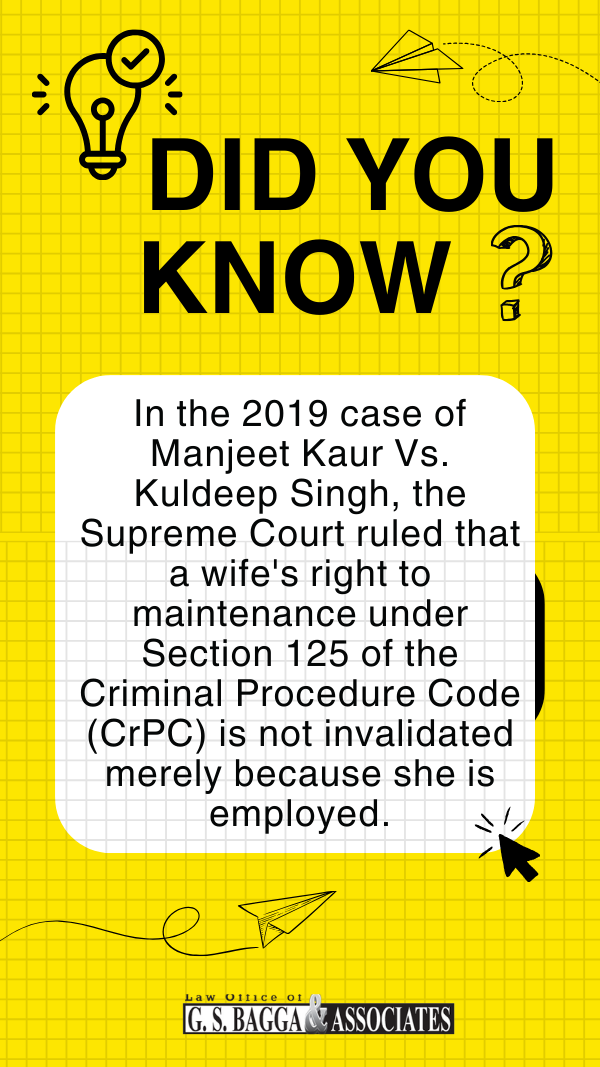When it comes to alimony cases, it is tough to address the question – can a working wife get alimony in India? – because it is a nuanced and often misunderstood matter.
In the past, Indian working wives didn’t usually receive alimony. But as society changed and more women joined the workforce, new laws emerged to clarify when is a wife eligible for alimony.
This article explains whether working women can get alimony in India and gives clarity on statements like – ‘no alimony to an educated wife’ – buzzing in the media. It also covers how can a working wife get alimony in India.
Things You’ll Learn –
- Can A Working Wife Get Alimony In India?
- Eligibility Criteria For Working Wife Maintenance
- Laws For Granting Alimony To Working Wife In India
- Can A Court Deny Alimony To A Working Wife?
- Challenges Of Working Women Seeking Alimony
- How Can Working Women Claim Alimony?
Can A Working Wife Get Alimony In India?
Yes, a working wife can claim alimony in India according to Section 25 of the Hindu Marriage Act.
This section empowers courts to grant maintenance to either spouse, including the working wife, during and after divorce proceedings. The same is mentioned in other laws like the Muslim Personal Law, the Parsi Marriage and Divorce Act, etc.

Who Qualifies As A Working Woman In Alimony Cases?
When dealing with alimony cases, the term working woman refers to a woman who can support herself financially and take care of her basic needs.
However, there are times when married working women’s income is insufficient to meet their needs and they are left to depend on their husbands. These ladies are qualified to receive alimony payments or wife maintenance in a set amount.
Read the examples below to gain more clarity:
1. The Supreme Court Case Of Kalyan Dey Chowdhury vs Rita Dey Chowdhury (2016):
A benchmark was established wherein 25% of the husband’s net salary was deemed a “just and proper” amount for alimony. However, it was clarified that each case necessitates an individual assessment, taking into account factors such as the wife’s earning capacity.
2. The Supreme Court Case Of Manju Rani vs Anil Kumar (2019):
Although the wife was employed, the court granted alimony. This decision was based on her comparatively lower income compared to her husband’s and her significant contributions to household expenses throughout the marriage.
3. Supreme Court case of Sheela Devi vs State of Kerala (2017):
The issue revolved around maintenance under Section 125 CrPC. The court emphasized the husband’s duty to financially support his wife, irrespective of her earning capacity, if she lacks adequate means to sustain herself.
Well, when is a wife eligible for alimony, especially a working wife?
Eligibility Criteria For Working Wife Maintenance
1. Income Disparity
The wife’s earning capacity and qualifications play a significant role in alimony cases. If the wife possesses a strong educational background and considerable earning potential, the court may be less inclined to award alimony.
If the wife’s income is significantly lower than the husband’s and is insufficient to – meet her basic needs and maintain the standard of living she enjoyed during the marriage – she can claim alimony.
2. Reason For Divorce
If the wife is not at fault for the divorce and has suffered financial hardship due to the breakdown of the marriage, she may be eligible for alimony.
3. Contributions To Marriage
Courts consider the financial contributions made by the working wife to the marriage and family income.
4. Presence Of Children
If the working wife is the primary caregiver for children, especially young children, the court may grant alimony to ensure their well-being.
5. Age And Health Of The Wife
The court may consider the wife’s age and health limitations when determining her ability to earn and support herself.
6. Lifestyle And Expenses
Courts evaluate the wife’s income, assets, and reasonable living expenses, including accommodation, food, clothing, and healthcare, to determine the need for alimony.
7. Dependence On The Husband
If the wife was financially dependent on the husband during the marriage, the court may consider granting alimony to maintain her financial stability post-divorce.
8. Standard Of Living During Marriage
The court aims to ensure that the wife maintains a similar standard of living after divorce as she did during the marriage.
Also Read – Can Wife Claim Alimony After Mutual Divorce?
Alimony Laws For A Working Wife In India
Here’s a breakdown of the key laws of alimony for a working wife in India.
- Hindu Marriage Act, 1955: Section 24 of the Act empowers courts to grant maintenance to a wife during and after the pendency of a matrimonial proceeding, based on her needs and the husband’s capacity to pay.
- Code of Criminal Procedure, 1973: Section 125 grants maintenance rights to a wife unable to maintain herself for various reasons, including if she is employed but her earnings are insufficient.
- Muslim Women (Protection of Rights on Divorce) Act, 1986: This act provides maintenance rights to Muslim women similar to the Hindu Marriage Act.
- Special Marriage Act, 1954: Section 37 provides for maintenance rights similar to the Hindu Marriage Act, applicable to interfaith marriages.
Remember, courts are increasingly recognizing the wife’s non-monetary contributions to the family when determining alimony.
Judicial Role In Granting Alimony To Working Wife
The Indian judiciary plays a crucial role in determining maintenance or alimony for working women in India during matrimonial disputes.
While the wife’s employment status is one of the main factors considered by the court, it’s not the sole determinant of alimony or wife maintenance. Besides the above-given eligibility criteria, here are other factors considered by the Indian judiciary
1. Husband’s Income And Financial Obligations
The court will consider the total number of dependents on the husband and his financial responsibility towards them. Additionally, it considers the personal expenses of the husband. Furthermore, the court evaluates the husband’s capacity to pay alimony without experiencing excessive financial strain.
2. Supreme Court Guidelines
25% of the husband’s net monthly income might be considered as a benchmark for periodic payments.
3. One-Time Settlements
These typically range between 1/5th to 1/3rd of the husband’s net worth.
4. Other Factors Considered
The court weighs various factors like both spouses’ incomes, assets, additional earnings, lifestyle, conduct during marriage, and any children’s needs.
The court also determines whether the wife has a real claim for maintenance. Additionally, the court will also assess the validity of the wife living apart (if she does).
Can A Court Deny Alimony To A Working Wife?
Yes!
Here are some situations where a court might deny alimony to a working wife:
1. Sufficient Income
If the wife’s earnings adequately meet her reasonable needs and sustain the standard of living established during the marriage, the court may deem her financially independent, thus rejecting alimony from the husband.
2. Non-Disclosure Of Income
Should the wife intentionally misrepresent or conceal her actual income, her claim for alimony may be dismissed by the court.
3. Ability To Work And Earn
A court may deny alimony if the wife possesses the qualifications and skills to obtain suitable employment, ensuring her financial self-sufficiency. This led to all the buzz about ‘no alimony to educated wife’ in the media.
4. Mutual Consent
In cases of mutual consent divorce where a settlement agreement addresses the wife’s financial security, additional alimony may not be deemed necessary.
5. Conduct Of The Wife
Exceptionally, the court might consider the wife’s conduct during the marriage, such as adultery or cruelty toward the husband, as grounds for denying alimony.
6. Substantial Assets
If the wife already possesses significant assets or inherited property that can sustain her financially, the court may forego awarding alimony.
7. Misuse of Alimony
Evidence of the wife misusing previously awarded alimony for non-essential purposes may lead to the denial of further alimony or wife maintenance.
8. Husband’s Inability to Pay
If the husband demonstrates his financial incapacity to pay alimony due to his own financial hardships or limited income, the court might refrain from granting alimony to the wife.
By considering these factors, courts aim to ensure equitable outcomes in alimony decisions while accounting for the specific circumstances of each case.
How Much Alimony Can A Working Wife Get?
The length of the marriage, both spouses’ financial situations, and other factors can all affect the amount and duration of alimony.
Here are the national averages based on the length of marriage to get alimony or wife maintenance in India, while the final judgment will vary by case (and each state has its own set of criteria for courts to follow):
- 5 Years – If you have been married for fewer than five years, you will receive alimony for about half of that time.
- 10–20 years – On average, alimony payments will cover 60–70% of the duration of your marriage. Consequently, your alimony will probably last 12 to 14 years if you were married for 20 years. That can, however, differ significantly based on your unique situation and the judge who is considering your case.
- 20+ Years – Permanent alimony is more likely to be awarded in marriages that have lasted 20 years or more. It means that until your ex-spouse retires, gets married again, or dies, you should expect to provide for them.
Also read – Factors That Influence The Duration And Amount Of Alimony
Can A Wife Ask For Alimony If She Earns More Than Husband?
Technically, Yes in India whether a wife who earns more than her husband can still ask for alimony is a complex question with no straightforward answer. It ultimately depends on various factors and the court’s discretion.
The law doesn’t explicitly bar a wife from claiming alimony or wife maintenance just because she earns more than her husband. Several provisions provide for spousal maintenance, including Section 24 of the Hindu Marriage Act and Section 125 of the Code of Criminal Procedure.
Here’s a breakdown of possible scenarios:
1. Full alimony
If the wife’s income falls short of her needs despite earning, and the husband has the capacity to pay, the court might grant full alimony.
2. Partial alimony
The court might award partial alimony if the wife’s income partially covers her needs but not entirely.
3. No alimony
If the wife’s income significantly exceeds her needs and the husband lacks the capacity to pay, the court might deny alimony.
Also read – Common Mistakes To Avoid During Property Division In A Divorce Case
Challenges Of Working Women Seeking Alimony In India

Working women seeking alimony in India face challenges such as stereotypes that may influence judicial decisions, the burden of proving financial need, and the lengthy legal process involved in resolving alimony cases.
Overcoming these challenges often requires seeking legal counsel, gathering evidence to support one’s claims, and navigating negotiations with the spouse or through the court system effectively. For more understanding read below how can a working wife get alimony in India.
Also read – How To Choose A Divorce Lawyer In Delhi?
How Can Working Women Claim Alimony In India?
1. Consult a lawyer
Seeking legal advice from a family law expert is crucial to understand your specific situation and legal rights and to navigate the alimony process effectively.
2. Gather evidence
Prepare documents supporting your claims, including income proof, evidence of lifestyle during marriage, and reasons for divorce.
3. Negotiate settlement
If possible, try to reach an amicable agreement with your spouse regarding alimony.
4. Expect No fixed percentage
There’s no fixed percentage of the husband’s income awarded as alimony for working women in India. The amount varies depending on the aforementioned factors and is determined by the court on a case-by-case basis.
5. Try for mutual consent
If both spouses agree, they can settle the alimony amount through a mutual consent agreement.
Also read – Procedure For Divorce By Mutual Consent In India
The Takeaway
Working wives in India can claim alimony regardless of whether their income surpasses that of their husbands. The court considers various factors like standard of living, husband’s capacity, and reason for divorce before granting alimony for working women in India.
Alimony awards may range from full to partial, or even none, depending on the case at hand. Dealing with this intricate possible can be daunting and seeking legal advice is crucial for a thorough understanding of one’s rights and a successful outcome.
Did you enjoy reading the post on – ‘can a working wife get alimony in India?’ Drop a comment below.
Disclaimer: This post was originally published on February 20, 2018, and was updated on February 29, 2024, to reflect current information. We strive to ensure accuracy and relevance in our content updates.




